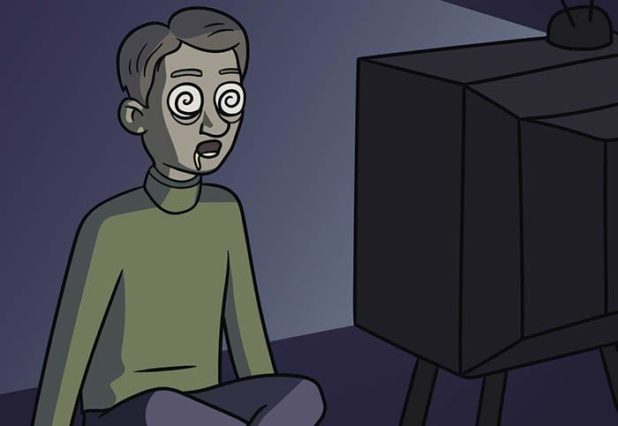Pomidor Quixote
Daily Stormer
March 2, 2019
Do you want some popcorn with your social programming ration?
There’s a new study suggesting that sitting in front of a television is a very bad deal for people who want to protect their mental acuity.
People over-50 who watch more than three-and-a-half hours of television a day are more at risk of memory loss, research suggests.
A study of more than 3,600 older adults revealed watching too many soaps, documentaries or reality shows reduces their ability to recall words by up to ten per cent.
Overindulging in your favourite shows could trigger a ‘cognitive stress’ that leads to memory loss, the researchers claim.
It may also take away from activities that keep older people sharp, such as reading or playing educational games online.
The research was carried by University College London and led by Dr Daisy Fancourt, senior research associate in the department of behavioural science and health.
‘There has been interest for over a decade in the effect of television viewing behaviours on cognition, but much of this literature has concentrated on children,’ Dr Fancourt said.
‘Much less attention has been paid to the effects of television viewing at the other end of the lifespan, despite it being hypothesised for over 25 years that watching excessive television could contribute to the development of dementia.’
…
Results – published in the journal Scientific Reports – revealed those who watched more than 3.5 hours of television a day experienced an average ‘verbal memory’ decline of between eight and ten per cent over the six years.
This is compared to a 4-to-5 per cent decline among those who watched less TV.
The findings remained true ever after adjusting for factors such as exercise, and the time spent sitting or online.
Dr Bob Patton, a lecturer in clinical psychology at the University of Surrey, claims TV has been linked to changes in the viewer’s brain’s structure, particularly in the regions responsible for learning and memory.
…
‘Watching television may have educational benefits from watching documentaries and relaxation benefits as a way of reducing stress,’ Dr Fancourt said.
‘[But] overall this suggests adults over the age of 50 should try and ensure television viewing is balanced with other contrasting activities.’
She added: ‘Although television viewing remains high in care homes where residents have less control over their own viewing, the desire to watch television declines amongst people with dementia as symptoms of the disease become evident.’
Television is really something. Before it came around, it wasn’t common to just sit there with your eyes open for hours numbing your mind and taking in whatever was vomited into your brain.
Back then people had more mental barriers up, their minds were better defended.
Back then, people also had it better because back then everything was actually better.
Painful isn’t it?
You could drown your thoughts in some TV to feel better…
Now TV can not only socially program our people but also emotionally program them to go along with the destruction of our civilization. Sound effects, music, volume, the colors used, the tones, odd frames your conscious mind can’t process fast enough, and even sounds that you can’t easily hear; they use all kinds of shit to play with your mind.
They manipulate your emotions to lower your logical defenses. They want to “persuade” you.
They want to program you.
The programming takes its toll, and this study shows that older people experience some measurable effects of it. There may be many more of these “side effects” that we’re currently not aware of.
Ignore the Jewbox. Stay sharp.
 Daily Stormer The Most Censored Publication in History
Daily Stormer The Most Censored Publication in History








